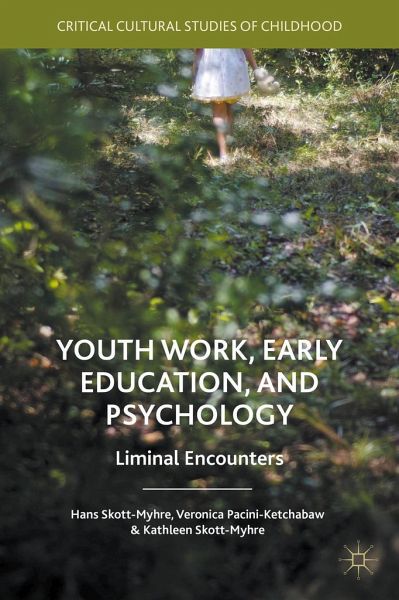
Gebundenes Buch
Youth Work, Early Education, and Psychology
Liminal Encounters
Herausgegeben: Pacini-Ketchabaw, Veronica; Skott-Myhre, Hans
Versandkostenfrei!
Versandfertig in 6-10 Tagen

PAYBACK Punkte
19 °P sammeln!





Youth Work, Early Education, and Psychology re-examines the set of relations generally referred to as working with children and youth. It presents a series of propositions that highlight politicized strategies to working with young people under current conditions of late liberal capitalism.
Hans Skott-Myhre is Professor of Child and Youth Studies at Brock University, Canada. Veronica Pacini-Ketchabaw is Professor of Child and Youth Care at the University of Victoria, Canada. Kathleen Skott-Myhre is Assistant Professor at the University of West Georgia, USA.
Produktdetails
- Critical Cultural Studies of Childhood
- Verlag: Palgrave Macmillan / Palgrave Macmillan US / Springer Palgrave Macmillan
- Artikelnr. des Verlages: 978-1-137-48003-3
- 1st ed. 2016
- Seitenzahl: 258
- Erscheinungstermin: 4. November 2015
- Englisch
- Abmessung: 216mm x 140mm x 16mm
- Gewicht: 468g
- ISBN-13: 9781137480033
- ISBN-10: 1137480033
- Artikelnr.: 42954878
Herstellerkennzeichnung
Libri GmbH
Europaallee 1
36244 Bad Hersfeld
gpsr@libri.de
"This book is a deeply satisfying journey through the liminal spaces of youth work/child and youth care, education, and psychology. In order to rethink how we approach young people particularly under the suffocating influence of global capitalism the authors in this powerful collection interrogate conventional approaches and institutions, finding them to be utterly unworkable. Instead, they draw upon the possibilities offered through a liminal and immanent theoretical framework in order to shatter our preconceived notions of the 'helping adult'. This is not a book that tells you how to fix young people; this is a book that demonstrates how to think with young people as a form of resistance, rebellion, and refusal to developmental and
Mehr anzeigen
humanist perspectives. In these richly written pages, you will find a unique approach to youth work/child and youth care that explodes dualisms, escapes limiting enclosures, and imagines a re-signification of adult-child relations. Indeed, this book is a vital conceptualization of youth work/child and youth care for the twenty-first century and without a moment to lose." - Shauna Pomerantz , Associate Professor of Child and Youth Studies, Brock University, USA; author of Girls, Style, and School Identities: Dressing the Part (2008)
"Visualize this a young person, being led in handcuffs by uniformed adult security guards out of Wal-Mart, resisting slightly but unable to overcome the force of the underwhelmingly seized guards. Before you read this book, you may describe this visual image as a scene capturing a shoplifting incident. After you have read this book, you will recognize the immense irony, and perhaps farce, of the dialectical and paradoxical impact of late capitalism on the social relations constructed as rationale hierarchies and absurd binaries of right and wrong, of truth and consequence. In this book, this image reflects the moment in which the species digests its waste. Who really is the thief? And who really guards the embedded structures of power? Exploring adult-youth relations in the context of late capitalism and its decrepit structures of power and ethics is a suspenseful thriller. It has immediate relevance to child and youth care practice, to youth work, and to imagining the very idea of youth, particularly in its relational context. Although the book is defiant in its critique of presumption, radical in its rejection of categories of any kind, and absurdly brilliant in its reconstruction of the movement of time as immanence, it is also reflective of a politic of hope and emancipation. Being with young people, it turns out, is a contingency, not a task. And by the time we close the back cover, just who is young and who has passed through the age of youth, becomes a question of relations, filled with possibility for something better, or at least something a little more authentic, which probably is better." - Kiaras Gharabaghi, Associate Professor of Child and Youth Care, Ryerson University, Canada; author of Professional Issues in Child and Youth Care Practice (2010)
"Translating complex posthuman philosophical and political ideas into accessible examples of youth work, care and education practice, this substantial edited collection offers not only challenges, but also new methods and concepts for rethinking radical and engaged work with children and young people. From ice hockey to suicide prevention, from mindfulness to car crashes in the classroom, from supervision to psychotherapy, from youth as troublesome to youth as troubling prevailing boundaries, this volume delivers on its promise to identify and conceptualize transformative, cross disciplinary practice." - Erica Burman, Professor of Education, Manchester Institute of Education, UK; author of Deconstructing Developmental Psychology (1994) and Developments: Child, Image, Nation (2007)
"Visualize this a young person, being led in handcuffs by uniformed adult security guards out of Wal-Mart, resisting slightly but unable to overcome the force of the underwhelmingly seized guards. Before you read this book, you may describe this visual image as a scene capturing a shoplifting incident. After you have read this book, you will recognize the immense irony, and perhaps farce, of the dialectical and paradoxical impact of late capitalism on the social relations constructed as rationale hierarchies and absurd binaries of right and wrong, of truth and consequence. In this book, this image reflects the moment in which the species digests its waste. Who really is the thief? And who really guards the embedded structures of power? Exploring adult-youth relations in the context of late capitalism and its decrepit structures of power and ethics is a suspenseful thriller. It has immediate relevance to child and youth care practice, to youth work, and to imagining the very idea of youth, particularly in its relational context. Although the book is defiant in its critique of presumption, radical in its rejection of categories of any kind, and absurdly brilliant in its reconstruction of the movement of time as immanence, it is also reflective of a politic of hope and emancipation. Being with young people, it turns out, is a contingency, not a task. And by the time we close the back cover, just who is young and who has passed through the age of youth, becomes a question of relations, filled with possibility for something better, or at least something a little more authentic, which probably is better." - Kiaras Gharabaghi, Associate Professor of Child and Youth Care, Ryerson University, Canada; author of Professional Issues in Child and Youth Care Practice (2010)
"Translating complex posthuman philosophical and political ideas into accessible examples of youth work, care and education practice, this substantial edited collection offers not only challenges, but also new methods and concepts for rethinking radical and engaged work with children and young people. From ice hockey to suicide prevention, from mindfulness to car crashes in the classroom, from supervision to psychotherapy, from youth as troublesome to youth as troubling prevailing boundaries, this volume delivers on its promise to identify and conceptualize transformative, cross disciplinary practice." - Erica Burman, Professor of Education, Manchester Institute of Education, UK; author of Deconstructing Developmental Psychology (1994) and Developments: Child, Image, Nation (2007)
Schließen
Für dieses Produkt wurde noch keine Bewertung abgegeben. Wir würden uns sehr freuen, wenn du die erste Bewertung schreibst!
Eine Bewertung schreiben
Eine Bewertung schreiben
Andere Kunden interessierten sich für













